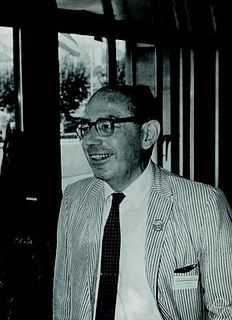A Quote by John Arbuthnot
The Reader may here observe the Force of Numbers, which can be successfully applied, even to those things, which one would imagine are subject to no Rules. There are very few things which we know, which are not capable of being reduc'd to a Mathematical Reasoning, and when they cannot, it's a sign our Knowledge of them is very small and confus'd; and where a mathematical reasoning can be had, it's as great folly to make use of any other, as to grope for a thing in the dark when you have a Candle standing by you.
Related Quotes
The mathematical is that evident aspect of things within which we are always already moving and according to which we experience them as things at all, and as such things. The mathematical is this fundamental position we take toward things by which we take up things as already given to us, and as they must and should be given. Therefore, the mathematical is the fundamental presupposition of the knowledge of things.
I am fully assured, that no general method for the solution of questions in the theory of probabilities can be established which does not explicitly recognize, not only the special numerical bases of the science, but also those universal laws of thought which are the basis of all reasoning, and which, whatever they may be as to their essence, are at least mathematical as to their form.
Mathematical reasoning may be regarded rather schematically as the exercise of a combination of two facilities, which we may call intuition and ingenuity. The activity of the intuition consists in making spontaneous judgements which are not the result of conscious trains of reasoning. The exercise of ingenuity in mathematics consists in aiding the intuition through suitable arrangements of propositions, and perhaps geometrical figures or drawings.
If the system exhibits a structure which can be represented by a mathematical equivalent, called a mathematical model, and if the objective can be also so quantified, then some computational method may be evolved for choosing the best schedule of actions among alternatives. Such use of mathematical models is termed mathematical programming.
To do any important work in physics a very good mathematical ability and aptitude are required. Some work in applications can be done without this, but it will not be very inspired. If you must satisfy your "personal curiosity concerning the mysteries of nature" what will happen if these mysteries turn out to be laws expressed in mathematical terms (as they do turn out to be)? You cannot understand the physical world in any deep or satisfying way without using mathematical reasoning with facility.
Mathematics is a logical method. . . . Mathematical propositions express no thoughts. In life it is never a mathematical proposition which we need, but we use mathematical propositions only in order to infer from propositions which do not belong to mathematics to others which equally do not belong to mathematics.
you never know which thing you do is going to turn out to be important. I'm sure we've all done very small things that had very great impact and very big things that didn't make any difference. So, create the means that best reflect the ends we want. Try to make each moment authentic, and you'll get to an authentic end.
The real, then, is that which, sooner or later, information and reasoning would finally result in, and which is therefore independent of the vagaries of me and you. Thus, the very origin of the conception of reality shows that this conception essentially involves the notion of a COMMUNITY, without definite limits, and capable of a definite increase of knowledge.
The Mathematics are Friends to Religion, inasmuch as they charm the Passions, restrain the Impetuosity of the Imagination, and purge the Mind from Error and Prejudice. Vice is Error, Confusion, and false Reasoning; and all Truth is more or less opposite to it. Besides, Mathematical Studies may serve for a pleasant Entertainment for those Hours which young Men are apt to throw away upon their Vices; the Delightfulness of them being such as to make Solitude not only easy, but desirable.
There is (gentle reader) nothing (the works of God only set apart) which so much beautifies and adorns the soul and mind of man as does knowledge of the good arts and sciences . Many arts there are which beautify the mind of man; but of all none do more garnish and beautify it than those arts which are called mathematical , unto the knowledge of which no man can attain, without perfect knowledge and instruction of the principles, grounds, and Elements of Geometry.
Do you not think that there are things which you cannot understand, and yet which are; that some people see things that others cannot? But there are things old and new which must not be contemplate by men´s eyes, because they know -or think they know- some things which other men have told them. Ah, it is the fault of our science that it wants to explain all; and if it explain not, then it says there is nothing to explain.
It cannot be too strongly asserted that the insistence on blind, unreasoning faith is due mainly to the maintenance of a subject-matter upon which there was no knowledge, namely the 'other world'; and that this basis was assumed because of early man's preoccupation with death. It is, unfortunately, quite possible to believe a thing which is contradicted by facts, especially if the facts are not generally known; but if the whole position on which we rested our religions had been visibly opposed by what we did know, even the unthinking masses would, in time, have noticed it.

































